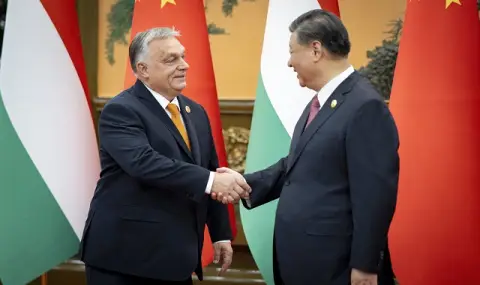An abundance of projects to build factories, billions of euro investments and the same proximity to Russia: under the auspices of the nationalist Viktor Orbán, Hungary has clearly moved closer to China, thus breaking away from the rest of the EU.
After France and Serbia, Xi Jinping arrives tonight in Budapest, the last leg of his European tour.
"A historic visit," said Hungarian Foreign Minister Peter Szijjártó regarding Xi Jinping's visit to Hungary. He recalled that the Central European country had not been visited by a Chinese president for more than two decades.
Far from the firmness demonstrated by the Europeans in the face of trade tensions with China, which are piling up, and the criticism of Beijing in connection with the Ukraine file, in Hungary Xi Jinping is treading as if on his own turf.
"This sends a signal to the EU by choosing to visit Hungary, which is the last country that is openly favorable to China among the 27," Tamas Mathura, an associate professor at Corvinus University, told AFP. .
For Viktor Orbán, it is a diplomatic success, the fruit of his policy of opening to the East, which he has implemented since he came to power in 2010 and began his diplomatic offensive to win new supporters. As Brussels distanced itself from Beijing, Orbán instead deepened those ties with China, rejecting the blocs' ideological clash.
In opposition to the European strategy to reduce risks, Hungary rolled out the red carpet for the Asian giant, which became the first investor in the country last year.
"Solid bilateral relations create confidence for Chinese companies, they are not afraid of adverse political developments that would disturb their business," said political scientist Yang Xuetong of the prestigious "Tsinghua" University.
Despite its small size - 9.6 million inhabitants - Hungary has been flooded by a wave of investment since 2022, particularly in the field of electric cars and batteries.
Everywhere plants are springing up at an impressive rate. The giant CATL has built a mega site near the city of Debrecen, while the car manufacturer BID will produce tourist vehicles in Szeged from next year.
According to the government, the current projects are valued at around 15 billion euros. In return, Chinese companies enjoy tax breaks in Hungary, from subsidies to infrastructure and job offers for their workers.
Hungary has also received loans from Beijing under the Belt and Road Initiative, officially called the Belt and Road. A high-speed rail line is to be built between Budapest and Belgrade, although the project has been plagued by delays.
In this all-encompassing cooperation, Budapest has bought Chinese Covid-19 vaccines, pledged to host the first Chinese university campus in the EU and recently signed a controversial security pact allowing Chinese police patrols on Hungarian territory.
This has raised the alarm of the opposition, which has criticized the lack of transparency surrounding the contracts, the environmental impact of battery factories and corruption. According to the opposition, "Orbán's circle" is enriched by the criminal projects.
Beyond economic ties, Hungary has managed to show itself as a useful partner for Beijing in international meetings, notes Tamas Mathura.
Regularly criticized by his Western partners for his authoritarian leanings, Viktor Orbán has on several occasions used his veto power to block or tone down the EU's critical statements on China, especially those on human rights in particular.
"A logic that can also be applied to NATO," says Matej Szymalczyk of the Slovakia-based Central European Institute for Asian Studies.
Because Hungary, a member of the Alliance since 1999, has distinguished itself from its partners by criticizing "militant fever" to Russia and pleads for a ceasefire in Ukraine.
"We are absolutely in agreement with China regarding the Ukrainian file,", emphasized Peter Szijjártó.
Beijing presents itself as a neutral country and regularly calls for a political settlement to end the fighting in Ukraine, while remaining close to the Kremlin. Like Budapest.
translation from French: Gabriela Golemanska, BTA
